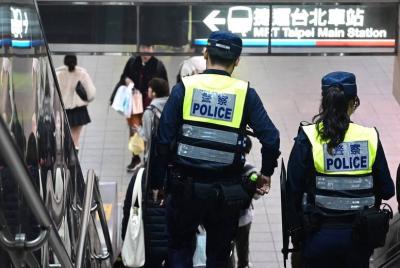A new survey showed that the public is seriously misinformed about incontinence and its treatment, the Taiwan Continence Society said on Saturday.
Almost 90 percent of the public believe the condition is caused by “a weak bladder,” while about 70 percent think it is a normal part of aging, society president and urologist Liao Chun-hou (廖俊厚) said at a news conference.
Incontinence is a complicated condition with multiple possible causes, he said, adding that obesity, constipation, pregnancy and prostate enlargement are as much to blame as aging or abnormal bladder functions.
The belief that incontinent people should drink less water, use the restroom more often, avoid leaving home and take over-the-counter medicine are misguided, he said.
Drinking less water could increase the risks of infection, while confining oneself to the home for a treatable condition is unnecessary and it is not likely that buying drugs without a medical diagnosis would help, he said.
People should not allow incontinence to interfere with their lives when treatment is available at clinics, he added.
Another common myth is that going to the gym, doing yoga or engaging in other forms of exercise would ameliorate the symptoms, society vice president and nurse Tsai Chuan-hsiu (蔡娟秀) said.
Specific types of exercise can strengthen pelvic floor, but increasing other types of exercise could make the condition worse, she said.
Only 15 percent of respondents were aware that incontinence is linked to a strain of constipation, while 70 percent of women reported using sanitary towels, which are not designed for fast absorption, she said.
The resulting uncleanliness and bad odor often keeps affected women at home, she said.
The online poll was conducted between May 14 and June 9, with 1,253 samples drawn from members of the public, healthcare workers and people with renal or urological conditions.

Beijing could eventually see a full amphibious invasion of Taiwan as the only "prudent" way to bring about unification, the US Department of Defense said in a newly released annual report to Congress. The Pentagon's "Annual Report to Congress: Military and Security Developments Involving the People's Republic of China 2025," was in many ways similar to last year’s report but reorganized the analysis of the options China has to take over Taiwan. Generally, according to the report, Chinese leaders view the People's Liberation Army's (PLA) capabilities for a Taiwan campaign as improving, but they remain uncertain about its readiness to successfully seize

Taiwan is getting a day off on Christmas for the first time in 25 years. The change comes after opposition parties passed a law earlier this year to add or restore five public holidays, including Constitution Day, which falls on today, Dec. 25. The day marks the 1947 adoption of the constitution of the Republic of China, as the government in Taipei is formally known. Back then the Chinese Nationalist Party (KMT) governed China from Nanjing. When the KMT, now an opposition party in Taiwan, passed the legislation on holidays, it said that they would help “commemorate the history of national development.” That

Taiwan has overtaken South Korea this year in per capita income for the first time in 23 years, IMF data showed. Per capita income is a nation’s GDP divided by the total population, used to compare average wealth levels across countries. Taiwan also beat Japan this year on per capita income, after surpassing it for the first time last year, US magazine Newsweek reported yesterday. Across Asia, Taiwan ranked fourth for per capita income at US$37,827 this year due to sustained economic growth, the report said. In the top three spots were Singapore, Macau and Hong Kong, it said. South

Police today said they are stepping up patrols throughout the Taipei MRT system, after a social media user threatened to detonate a bomb at an unspecified station this afternoon. Although they strongly believe the threat to be unsubstantiated, Taipei Metro police and the Railway Police Bureau still said that security and patrols would be heightened through the system. Many copycat messages have been posted since Friday’s stabbing attacks at Taipei Main Station and near Zhongshan MRT Station that left three dead and 11 injured, police said. Last night, a Threads user in a post said they would detonate a bomb on the Taipei